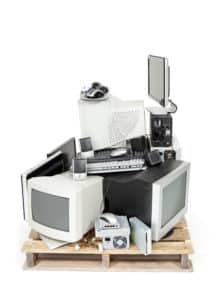The year 2020 has become the year of the remote workforce. Subsequently, there has been an increase in new computer and laptop sales as employees have upgraded their work-from-home infrastructure. What about that old computer gathering dust in the corner?

While it may be tempting to go for the quick fix and dump it in the trash can, here is a list of seven good reasons to recycle your old computer by taking it to a recycling center.
Reach the right destination: Putting your computer or other electronic waste in your curbside recycling bin will not get it recycled. Computers and computer monitors are bulky and made of multiple materials including metal, plastic and glass, so they usually can’t be handled by a municipal recycling program. To ensure your computer is responsibly recycled you will need to take it to or have it picked up by a destination that handles computer or electronic waste recycling.
Minimize electronic waste in landfills: Lead, chromium, mercury, cadmium, and flame retardants are some of the materials included in the manufacturing of computers. It is always worthwhile to recycle trash when possible to conserve landfill space. In the case of computers, however, it takes on additional importance to avoid landfilling so that some of these toxic components do not leach out into the soil or groundwater.
Reclaim valuable materials: Computers are manufactured using a variety of valuable material including gold, copper, aluminum, silver, platinum, silicon, tin, iron, plastic and palladium, among other things. Almost all of these materials can be recycled repeatedly without any degradation of their properties. In the recycling process, these materials are recovered and reused for another purpose. If they were not recycled, they would be destined for the landfill. To benchmark the economic impact of this recycling, in its 2016 environmental report, Apple said it recovered 2,204 pounds of gold from recycled iPhones, iPads and Macs, worth at the time, more than $40 million.
Preserve natural resources: Recycling computers allows reuse of metals, plastic and glass among other items. The availability of this recycled material reduces demand for newly mined virgin material. This conserves these natural resources and reduces the need for mining and manufacturing brand new material.
Save energy: Reducing reliance on newly manufactured or virgin materials has the added benefit of reducing energy consumption. It requires far less energy to recycle material than it does to create new material from ores or feedstock. For instance, according to the Environmental Protection Agency (EPA), recycling one million laptops saves the energy equivalent to the electricity used by more than 3,500 homes in a year.
Obey the law: It might be against the law if you do not recycle your computer, depending on where you live. According to the National Conference of State Legislatures, 25 states and the District of Columbia have laws establishing statewide electronic waste recycling programs. As of 2017, 17 of those states, like Colorado, banned electronic devices, like computers and cell phones, from landfills. The laws typically require the manufacturer to take responsibility by paying to collect and recycle products covered under the law. In some cases, consumers pay retailers a fee at the time of purchase to set up a statewide e-waste recycling fund, like in California. As more laws are passed, more cities and counties will help establish programs to ensure computers and other e-waste is properly recycled.
Dispose of with ease: Given the patchwork of state laws and the lack of curbside recycling, it may seem complicated to recycle your computer. However, a host of recycling businesses, charitable organizations, manufacturers and retailers make it easy to properly dispose of your old electronics. For instance, Dell Reconnect has partnered with Goodwill to encourage computer drop off at participating Goodwill stores. Additionally, many retailers like Best Buy and Staples offer electronic recycling programs and will allow drop off of old computers. An internet search can help you locate a recycling business or retail location near you. The EPA website has a chart of retailers and manufacturers on its Electronics Donation and Recycling page that will link to locations and specific collection opportunities.
Before you recycle your computer…
Before bringing your computer to a location to be recycled, there are a few steps to take in addition to just deleting files.
- Back up any important and personal information so that it can be saved and to help prevent identify theft. To do this it is recommended that you use an external hard drive. Alternatively, you can use a cloud service for ongoing backup. After backing up your files in the cloud, you can transfer them to a new machine or access them anywhere you have an internet connection. Cloud storage is also beneficial if your computer has a problem and you need to restore your files, or if you are away from your computer and need to retrieve your data from a different device.
- De-authorize any programs you need an account or a license to run. Examples would be iTunes or Microsoft Office.
- Even though your data may be backed up, you should still remove sensitive personal information like tax returns with a data removal program. It is also recommended that you delete your browsing history.
- Perform a full factory reset of your machine to delete any saved preferences.
- Unplug your “peripherals” like your keyboard, mouse, speakers, and other connected hardware. If you can’t reuse these items with your new device, you can probably recycle them at the same place you are recycling your computer.
- If you have a laptop, try to remove the battery if you are going to ship it as part of a manufacturers’ mail back program. Many laptops have lithium-ion batteries which require special transportation.
- Consult the EPA’s Electronics Donation and Recycling page, check in with local recyclers and electronics retailers, or do an internet search of options in your area to locate a place that will accept your computer.
Once your old computer reaches its final destination, the recycling facility processing electronic waste will use mechanical shredding and hi-tech processes to separate the materials. In some cases, robots are actually utilized. According to its website, Apple has deployed robots names Daisy and Dave to improve disassembly and recovery of more materials in electronics recycling. Technology such as this is expected to improve and become more available as more municipalities and individuals seek to increase computer recycling.
Spurring on technological innovation may become reason number eight to recycle your old computer.
ScrapWare Corp., of Rockville, MD, has been providing software to the scrap metal recycling industry for over 30 years. ScrapWare uses an Oracle database to provide a cloud-based software solution to manage all aspects of a recycling business. With numerous modules, extensive technical support, remote installation and online training, ScrapWare helps recycling companies with compliance, efficiency and profitability. Check out ScrapWare’s website, read the user testimonials, and see its offerings for your recycling software solution.
